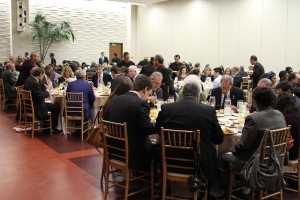USC hosts 42 ambassadors for State Dept.
Ambassadors to the United States representing more than 40 countries came to campus Friday to learn about innovation as part of a three-day tour of Los Angeles sponsored by the U.S. Department of State.
The senior diplomats heard about such topics as branding, changes in social media and the availability of capital in Los Angeles over breakfast in the Ronald Tutor Campus Center ballroom. The stop at USC was one of three that day.
Kamyl Bazbaz, a public affairs officer for the U.S. Department of State, said the program breeds collaboration.
“The goal is really to get these incredible senior diplomats outside of Washington, have them experience the rest of our country, plant the seeds for new partnerships or relationships and have this be the beginning of something really great,” Bazbaz said.

Foreign service · Ambassadors representing countries from five continents, the diplomat’s spouses, university officials and students listen to a panel over breakfast in the Ronald Tutor Campus Center ballroom on Friday. - Ani Kolangian | Daily Trojan
Some ambassadors said the discussion brought them to think about how their country pursues innovative ideas.
“The panel was important for us to think of ways to work with innovation and pass innovation to other countries. We need to create partnerships with universities so our country can look for the most advanced technology,” said Ambassador Peter Burian of the Slovak Republic. “We have something and USC has something to offer, so we need to work together to create a partnership.”
Ambassador Roman Kirn of Slovenia said the panel discussion gave him a broader meaning of innovation.
“I hadn’t heard such strong messages about social innovation and now it is something I have to think about more,” Kirn said. “We are always thinking about technical innovation, but it [is not everything].”
Speakers also stressed the role of universities in the process of innovation. Karen Kerr, senior director of New Ventures and Alliances at the USC Stevens Institute for Innovation, said USC understands that universities are a catalyst for innovation.
“USC has made a tremendous commitment to help advance technologies to the point where they really can be spun out of the university,” Kerr said. “And, it really takes a village. It’s not just the university, but it also has to involve the government and private partnership to be able to stimulate these innovations.”
Several ambassadors said it takes coordination to bring innovation from universities out to the wider population.
“It is obvious that USC has a lot to offer the world,” said Ambassador Evan J. Paki of Papua New Guinea. “It is important that we are always finding innovative ways to solve problems and that we are not only cooperating with other governments but with institutions within countries.”
When introducing the panel, USC President C. L. Max Nikias said universities should continually build on the past to innovate for the future through collaboration.
“Research universities like USC understand the problems of today are so complex they cannot be resolved with single answers or solutions from the past,” Nikias said. “We need to harness the power of every culture, every generation and every great mind.”
Several of the ambassadors said they were impressed by the university, including Ambassador Pavlos Anastasiades of Cyprus.
“I’ve never been here before, but I was impressed with what I saw,” Anastasiades said.
Ambassador Temur Yakobashvili of Georgia said the visit made a strong impression.
“I am disappointed I did not go to USC,” Yakobashvili said. “I wish I had gone here, and now I want my son to go here, because this university is the very best.”
This was the first time a trip has focused on Los Angeles since the Experience America program began in 2007. This is the ninth tour overall and the fifth during the Obama administration.
Anthony Bailey, associate provost for global initiatives, said the breakfast was a unique opportunity.
“We don’t often engage with ambassadors from smaller countries and this was a great way to do so — especially with African countries,” Bailey said.
The program exemplifies Secretary of State Hillary Clinton’s goal of using different ways to communicate diplomacy, Bazbaz said.
“This is what Secretary Clinton talks about with smart power — you need to use all your tools for diplomacy, not just traditional tools,” Bazbaz said. “Trips like this — public diplomacy programs — really make a difference. USC did a great job representing the United States.”
David Lowenstein contributed to this report.
